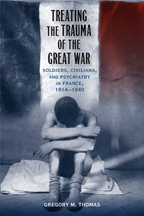
280 pages / 6.00 x 9.00 inches / 8 halftones
History / West European | History / France
From the outset of World War I, French doctors faced an apparent epidemic of puzzling neurological and psychiatric illnesses among soldiers. As they attempted to understand the causes of these illnesses, doctors organized specialized centers near the front, where they submitted soldiers to swift, humiliating treatments and then returned them to duty. At home, they interned the scores of civilians who succumbed to the war's strains in decrepit asylums or left them to fend for themselves. In Treating the Trauma of the Great War, Gregory M. Thomas explores the psychological effects of the war on French citizens, showing how doctors' understanding of mental illness produced deep, tangible effects in the lives of the men and women who suffered.
Doctors vigorously debated the war's role in the genesis of the neuropsychiatric disturbances observed in soldiers and civilians, but most psychiatrists ultimately concluded that mental illnesses appeared primarily in individuals predisposed to disease. Consequently, doctors granted their patients few favors when making decisions about diagnostic labels, treatment regimes, and pension allocations, leaving many to endure illnesses without adequate care or sufficient financial support. In their quest to understand the psychological impact of war, Thomas argues, doctors focused more on demonstrating the capabilities of their medical specialties and serving a state at war than on treating patients. Those aims significantly affected doctors' scientific conclusions, their medical and legal decisions, and their treatment practices. When the war ended, psychiatric reformers used the trauma of war to their advantage, promoting the perception of France as a traumatized nation in need of new psychiatric institutions that could accommodate a large and growing pool of psychologically wounded citizens.
Thomas draws on the vast medical literature produced during and after the war, including veterans' journals, parliamentary debates, newspaper articles, and medical administrative reports, infusing his narrative with a vivid human element. Though psychiatrists ultimately failed to raise the status of their specialty, Thomas reveals how the war helped precipitate lasting changes in psychiatric practice.
“Gregory Thomas's book is a welcome contribution to the historiography of psychiatry, war neurosis, and trauma. . . . A useful and absorbing account of French psychiatry's wartime activities.”—Journal of Modern History
“Thomas has added a well-researched and important chapter to our understanding of the psychological impact of World War One.”—Journal of Military History
“This marvellous book is a welcome addition to the historiographies of psychiatry, the Great War, and military medicine in France and beyond. Gregory Thomas tells a riveting story of a medical subspecialty desperately seeking to improve its status and the ways in which its practitioners instrumentalized the war to alter their standing in French society. . . . A clearly written and well-argued history of the concept of trauma itself.”—First World War Studies
Found an Error? Tell us about it.